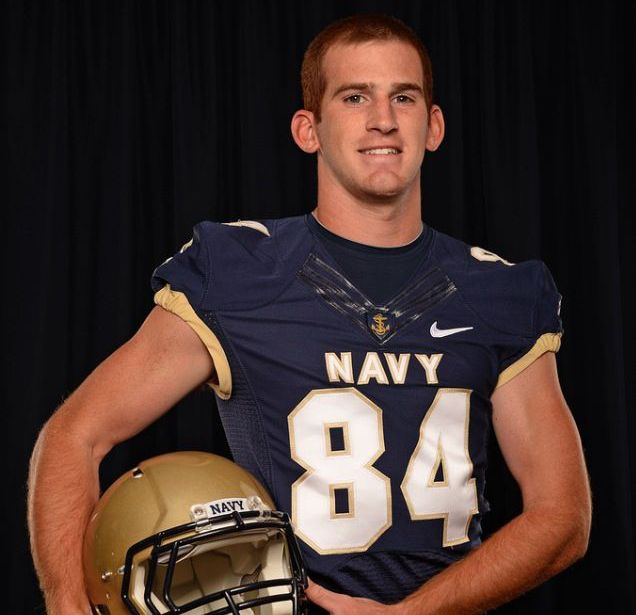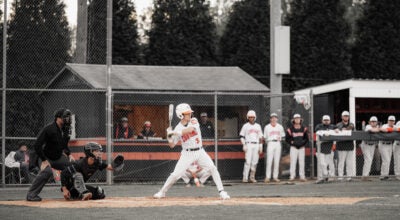West’s Brantley Horton set to graduate from Naval Academy
Published 12:00 am Monday, March 17, 2014
MOUNT ULLA — The military term for the uncertainty of the battlefield situations is “fog of war.”
While no one is shooting at you, the closest civilian experience to “fog of war” is the football field, where people try to follow orders and make instant decisions in emotional, fast-changing environments.
Imagine, for instance, the starting quarterback limping out of a playoff game, and the coach turning to a receiver and saying, “You’re our quarterback now.”
That scenario happened to West Rowan sophomore Brantley Horton in 2006. Jamel Carpenter was banged up in the Waddell game, and coach Scott Young informed Horton he was the next man up. Horton’s response was a calm, “Gotcha, Coach.”
While Horton didn’t do anything great, he showed his poise, didn’t make any mistakes and directed the Falcons for three series until Carpenter was able to return.
And maybe that’s the night we should’ve figured out that Horton, who had handled the fog of the football field, was destined for a military career.
Horton will graduate from the Naval Academy, where he managed to balance a football commitment with the classroom challenges of Annapolis, on May 23.
“It’s not an easy school, by any means,” Horton said. “But I was fortunate to have good coaches at West Rowan in football and baseball. They put me in positions of leadership as a junior and senior. They gave me experiences that have helped me at the Naval Academy.”
Horton’s athletic career at West was interesting. He was an all-conference baseball player and helped Mooresville American Legion get to a state tournament, but it’s for football that he’s remembered.
He was West’s JV quarterback as a freshman, a varsity receiver as a sophomore when he caught three TD passes against Lake Norman, the starting quarterback as a junior, and a receiver again as a senior after B.J. Sherrill, who was two classes behind Horton, emerged as the county’s next great field general.
“Brantley was part of a very special group of seniors, the guys who got our run here started,” Young said. “People shouldn’t forget that. Here was a guy who was the starting quarterback and he moved to receiver as a senior without complaint. It worked out for the team and it worked out for the young man.”
Horton was a decent quarterback and threw 12 TD passes for the 2007 Falcons, who finished 11-2.
As a senior in 2008, he was an all-county star for the first time, He played part of that season with a broken hand, but he made 47 catches for 876 yards and 11 touchdowns.
“There aren’t many times when I come home from Navy that I don’t watch those games on DVD,” Horton said. “Especially the game with Carver.”
The third-round 3A playoff game in Mount Ulla with Winston-Salem Carver may be the most significant game in West football history. It was the turning point. Up to that night in 2008, some fine West teams had not been able to make a serious impact on the state playoffs.
“Carver was great,” Young said. “If they’d beaten us, they would’ve won the state championship.”
Carver was stopping West’s great back K.P. Parks, and West trailed 16-7 late in the third quarter.
“We were dead in the water,” Young said. “We had to use trickeration to survive and advance.”
West had three “quarterbacks” on offense — Sherrill and receivers Jon Crucitti and Horton. For that trio, West had created a gadget play. Crucitti would run what looked like a reverse, but then he would pull up and throw downfield to Horton. The Falcons called it “QB3,” and it had worked perfectly early in the season against Statesville.
It worked again against Carver. By the time Crucitti, now a senior baseball player at Army, threw the ball, Horton was running free, and he caught a 60-yard TD pass (Army-to-Navy, as it turned out) that changed that game. West would win 20-16 on Austin Greenwood’s 50-yard dash with a faked punt, and the Falcons marched on to the first of three consecutive state championships.
Horton’s strong senior year gave him an opportunity to be recruited by Navy. That was the start of a long voyage that will finally reach port on May 23.
“Brantley’s done it the hard way,” Young said. “With no shortcuts.”
Horton attended the Naval Prep School for the 2009-10 academic year and played on the football team.
The last four years he was on the team in Annapolis. He mostly served on the scout team, helping the regulars prepare for Saturday games. It was a tough deal to grind out a limited role with no hope of reward, but Horton, a 6-foot-2, 179-pound receiver, stuck with it, while handling the demanding academic workload expected of everyone at the Naval Academy.
“The toughest challenges academically for me came early,” Horton said. “Physics and chemistry when I was a freshman and sophomore were tough. Just so many technical things.”
The toughest physical challenges have been the workouts/drills leading up the start of football practice.
“Those conditioning workouts are called ‘fourth quarters,’” Horton explained. “I thought high school football was tough, but looking back, I guess it wasn’t so bad. You’re up at 4:30 a.m. for those fourth quarters and you’re on the field at 5:30. Some of the most miserable mornings of my life.”
Horton finally got on the field for his first game for Navy as a junior. It was at East Carolina. Navy rolled 56-28. Horton got in for one play.
“I was four years into this when that happened,” Horton said. “Still, to have a chance to trot on the field and line up in a Division I football game, it was an experience I’m proud of.”
Navy rewards the seniors who stay the course. Horton dressed for many games as a senior and played in three — early against Delaware, on Senior Day against South Alabama, and in Navy’s win against Middle Tennessee in Texas, in the Armed Forces Bowl. The Midshipmen capped an 8-5 season with a 24-6 victory.
While he didn’t get on the field in the Army-Navy game, he did suit for it, and that was meaningful.
“As far as athletic thrills, that was second only to us winning the state championship,” Horton said. “I watched Army-Navy on TV a lot as a kid, and it’s just different from any other rivalry. There’s electricity in the air.”
Horton’s family supported him throughout his career. They traveled to all the home games, and they were at Army-Navy and the bowl game. They also support his career choice — the Marines.
Horton spent summers on ships in sunny venues such as San Diego and Hawaii, but a couple of years into his time at Navy, he realized his goal was to be an officer in the Marine Corps.
“I enjoy the physical side of being outdoors, and I like the camaraderie of still being on a team,” Horton said. “Some good people have influenced me in that direction, and the idea has grown on me the last few years.”
Horton will be commissioned as a second lieutenant when he graduates. On June 10, 18 days after graduation, he’ll report to Quantico. Va., for an intense six-month program at The Basic School.
“There are 270 of us in this graduating class going to the Marines — 170 as ground officers and 100 as pilots,” Horton said.
After that program, he’ll head into a specialized branch of service such as infantry, armor, artillery, engineering, logistics or intelligence. Football will no longer be part of his life. Horton’s last football act will be heading to the White House with the team to accept another Commander-in-Chief trophy for winning against Army and Air Force.
Horton hasn’t had many chances to talk to his friend Crucitti, who has played football for Army as well as baseball.
“After Army-Navy football games, they’re always pushing you to the locker rooms,” Horton said. “But I hope to see Jon when Army’s baseball team plays us here (in late April). I hope Jon goes 4-for-4, but obviously I want Navy to win.”
Crucitti is batting .362 and is a standout outfielder for Army, a situation that almost makes Horton wish he’d tried Navy baseball instead of football.
Almost.
“Football didn’t really work out the way I’d hoped, but I’d still do it all over again in a heartbeat,” Horton said. “I’ve had so many great experiences. There’s no way I could have passed them up.”
Not too far down the road, Horton may have to deal with the “fog of war” for real as a platoon commander of 40 Marines. He’s the kind of person you’d want to make tough decisions under pressure.






